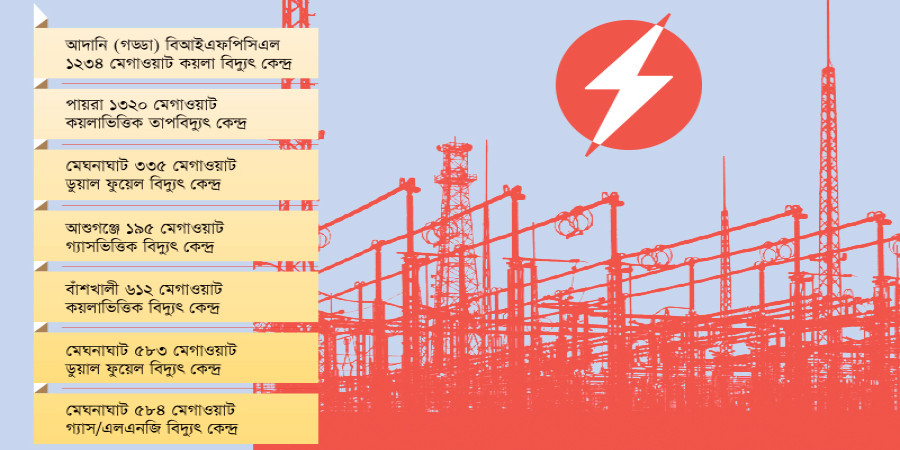
ছবি: Photo: Collected
The National Review Committee, formed to evaluate major power production agreements signed between 2009 and 2024, has recommended appointing an international legal and investigative agency to assist in the process. The proposal, led by retired Justice Moinul Islam Chowdhury, was submitted to the interim government, emphasizing the need for thorough analysis of contracts executed during Prime Minister Sheikh Hasina’s tenure.
The committee also requested additional time to analyze agreements in the power and energy sectors to ensure the government's best interests are safeguarded.
Recommendation for International Expertise
In its proposal, the committee emphasized the importance of aligning its findings with international arbitration laws and standards. This would facilitate the possibility of renegotiating or canceling contracts if deemed necessary. To achieve this, the committee has strongly recommended involving one or more top-tier international legal and investigative organizations. This approach aims to ensure that any investigations or renegotiations are credible and globally acceptable.
Data Collection Underway
The committee has already begun collecting data on several high-profile power agreements, including:
- Adani Group’s 1,600 MW coal-based power plant in Godda, India
- 1,320 MW coal-based thermal power plant in Payra, Patuakhali
- 335 MW dual-fuel power plant in Meghnaghat, Narayanganj
- 195 MW gas power plant in Ashuganj
- 612 MW (first unit) coal-based power plant in Banshkhali, Chittagong
- 583 MW dual-fuel power plant by Summit Group in Meghnaghat
- 584 MW LNG-based power plant by Unique Group in Meghnaghat
These projects, implemented under the controversial Quick Enhancement of Electricity and Energy Supply (Special Provisions) Act, 2010, have faced significant scrutiny over allegations of corruption, inefficiency, and excessive capacity charges.
The Legacy of the Special Provisions Act
Enacted in 2010, the Special Provisions Act was initially designed to address Bangladesh’s energy crisis by fast-tracking power and energy projects. However, its extension over 14 years allowed contracts to be awarded without competitive bidding. The law also provided immunity from judicial scrutiny, earning it the nickname "immunity law."
According to the Bangladesh Power Development Board (BPDB), this law facilitated the construction of 91 private and rental power plants with a total capacity of 11,700 MW. However, many plants remained idle, with the government paying hefty capacity charges to the operators, sparking widespread criticism.
Among the agreements under scrutiny is the 2017 contract with Adani Power for a 1,600 MW power plant in Godda, India. Allegations include overpricing of coal and an inflexible 25-year power purchase agreement requiring BPDB to buy 34% of the electricity even if demand is low.
Another significant project under review is the Payra Thermal Power Plant, a 1,320 MW ultra-supercritical coal plant jointly owned by the state-run North-West Power Generation Company Ltd (NWPGCL) and China National Machinery Import and Export Corporation (CMC). The project, costing BDT 19,550 crore, is Bangladesh's first ultra-supercritical power plant.
The interim government has already suspended the Special Provisions Act, leaving several power projects in limbo. Some contracts have been terminated as part of the reform process.
The National Review Committee, formed on September 5, 2024, was tasked with evaluating contracts signed under the Special Provisions Act to determine whether they align with national interests. The committee has the authority to:
- Collect data from any source.
- Audit relevant documents.
- Summon individuals or organizations for hearings.
- Recommend actions based on its findings.
The committee’s interim report, submitted on October 3, 2024, highlighted discrepancies in 11 power contracts, including those with Adani, Summit, and Beximco. It requested the Ministry of Power, Energy, and Mineral Resources to provide additional details to facilitate further analysis.
Critics argue that many agreements signed under the Special Provisions Act favored a select few companies, allowing them to extract excessive profits while burdening the government with capacity charges. Allegations of money laundering and inflated costs have also been raised.
The committee aims to ensure that its findings support Bangladesh in any potential international arbitration or negotiations, mitigating financial and reputational risks.
As the National Review Committee continues its work, the involvement of international legal and investigative agencies could bring greater transparency and credibility to the process. However, the implications of renegotiating or canceling these agreements remain a challenge, with potential repercussions for the country’s energy sector stability and international relations.
The government’s decisions on these high-stakes contracts will be critical in shaping the future of Bangladesh’s power and energy policy.
repoter






